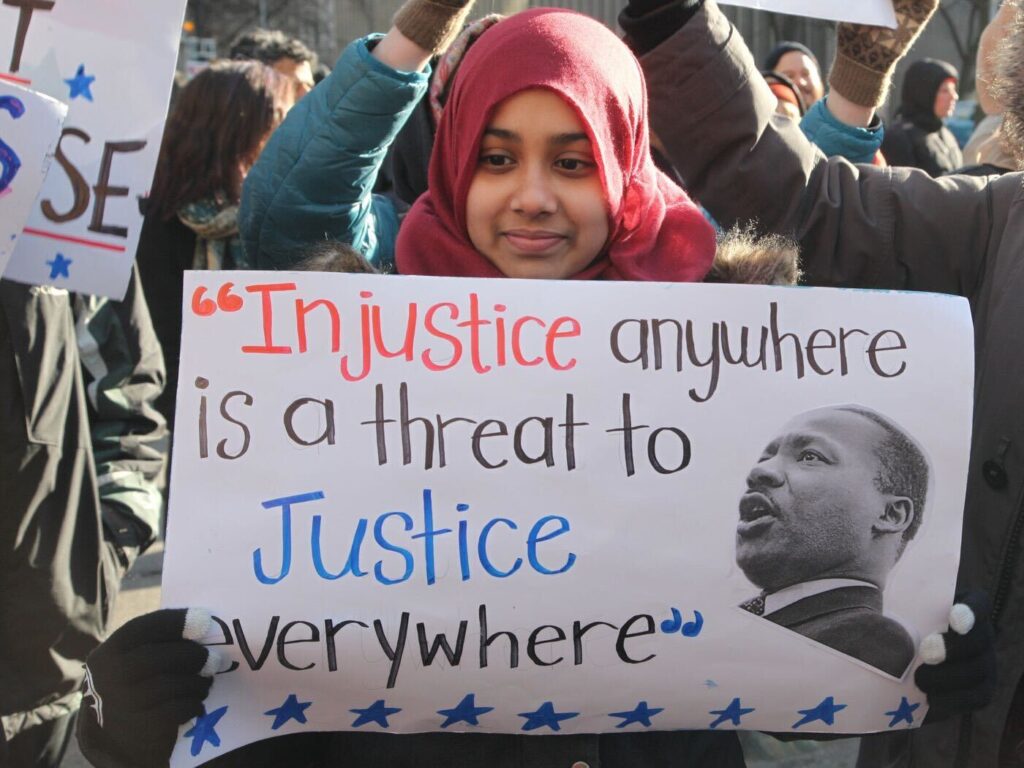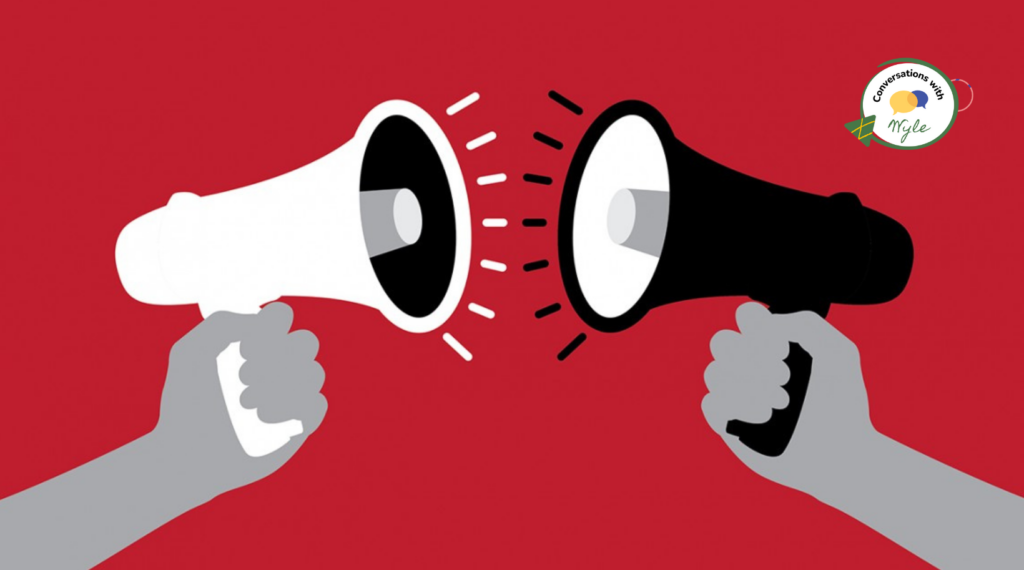How do we as leaders or colleagues begin to dismantle systemic discrimination and be better allies to our Muslim colleagues?
There are over 1 million Muslims in Canada. Muslims represent about 3.7 percent of the population and are the fastest growing religious group in the country1. Yet many people in Canada hold unfavourable views of Islam and Muslims, and Muslims face discrimination and bias in the labour market, at work, and in their everyday lives.
What is Islamophobia?
Islamophobia is fear and/or hatred of Islam or Muslims (or people perceived to be Muslim), leading to violence or systematic discrimination.
The term “Islamophobia” is problematic in three main ways:
- By focusing on religion alone, the term does not take into account the ways that discrimination and bias intersect and interact. Muslims may be discriminated against differently as a result of their race, gender, immigration status, class, or other factors.
- It suggests that hatred of Islam is a “phobia,” like an individual disorder or illness, when in fact it is a social bias and hatred.
- It suggests a minority of people hold this extreme “phobic” view, but, actually, large numbers of Canadians hold biases against Muslims and Islam.
Nonetheless, the term is here to stay, so it is important to understand the impact of using it. The term is often used to identify systemic patterns of bias and discrimination faced by Muslims. Examples of systemic discrimination Muslims experience include higher rates of unemployment, misrepresentation in media, unequal pay, and unequal outcomes in the justice, health, and school systems.
Anti-Muslim Bias in Canada
Large numbers of Canadians hold biases against Muslims and Islam more broadly. A recent study showed that 46 percent of Canadians have unfavourable views of Islam and believe that it is damaging to Canada and Canadian society. This number is twice as high as for any other religion2.
This bias shapes Canadians’ views of individual Muslims:
- 52 percent of Canadians feel that Muslims can be trusted “a little” or “not at all.”
- 42 percent of Canadians think discrimination against Muslims is “mainly their fault.”
- Less than 50 percent of Canadians would find it “acceptable” for one of their children to marry a Muslim3.
Ongoing stress from anti-Muslim sentiment – including harassment at work and school and in public places – is affecting the health of Muslim Canadians4.
The “Muslim Penalty” in the Labour Market
In the labour market, the effects of anti-Muslim bias are measurable. Researchers have shown the labour market does in fact exclude individuals based on religious affiliation: they have identified what they call the “Muslim Penalty.”5
At 13.9 percent, the rate of unemployment for Muslims is almost double the rate of the general population (7.8 percent). When race is factored in, the rate is even higher: 21 percent of Black Muslims face unemployment.
On average, Muslim income was $10,000 less than the national average, even when the studies control for education. Further, only 20 percent of immigrants from Muslim countries who specialized in a regulated occupation were working in their field in Canada.6
Anti-Muslim Bias in the Workplace
Bias and systemic discrimination towards Muslims is present in Canada’s workplace. The common barriers can be categorized into four areas – these also represent areas of opportunities for leaders to make an impact:
- Recruitment and hiring: Several studies have shown that employers regularly display bias toward people who appear Muslim, throughout the hiring process. For example, applicants with “Muslim-sounding” names receive fewer interviews and face many more barriers in the recruitment process.
- Religious freedom: People who are Muslim often feel uncomfortable disclosing their religion in the workplace because of their fear of discrimination based on the many people in Canada who hold unconscious, or conscious, biases toward Muslims and Islam. They are often concerned that these biases will impact how they are treated and will negatively affect their relationships.
- Accommodation: Muslim employees are unlikely to disclose the specific needs associated with their religion because of their discomfort and/or fear of discrimination in doing so. For example, in Ramadan, individuals may feel uncomfortable asking for accommodation for their religious practices, such as having time to pray or adjusting their work or meeting schedules to accommodate long hours of fasting.
- Psychological safety: When the muslim community is facing negative social events such as anti-muslim sentiment during election period or public debate about an anti-muslim law or legistlation, many members of the community might feel unsafe going about their regular daily routine such as commuting to work, sending their kids to schools or disclosing their religious beliefs to people outside their trusted circles.
Tackling Anti-Muslim Discrimination in Our Workplaces and Beyond
At Inclusivity, we define systemic anti-Muslim discrimination as the manifestation of the uneven distribution of power and opportunity based on Muslim faith. This means that if you see a group of people in your organization or community that appear to have greater access to opportunity and power than that of the Muslim community, you are right to question the fairness of the systems and assume discrimination is at play.
You cannot change what you refuse to confront.
How do we as leaders or colleagues begin dismantle systemic discrimination and be better allies to our Muslim colleagues? At Inclusivity we use a framework of ‘Acknowledge. Learn. Act’ to help shape our thinking and our approach to building equitable and inclusive organizations.

- Acknowledge – Acknowledge your biases and the impact of the culture on your thinking and belief. Acknowledge your privilege and the role you can play in addressing the issue.
- Learn – Increase your knowledge about Islam and the Muslim community. Make an intentional effort to surround yourself with diverse experiences.
- Act – Challenge assumptions and the status quo. Speak up and use your privilege to make change.
“If we keep ignoring these issues, if we are awkward or uncomfortable raising concerns or asking questions, we won’t make change. We need to confront the issues, we need to ask, and we need to be more comfortable with that discomfort. State your good intentions and work from there.” – Wyle Baoween, CEO, Inclusivity
Challenging our Assumptions
A key tactic to reduce bias is to pause, activate the slower and more calculated part of our brain, and question why we are thinking or behaving in a certain way. By doing this, we can challenge our assumptions and unconscious biases or beliefs we may hold about Muslims. Let’s consider the following:
Society traditions and cultural practices are different from religious practices. For example, if someone says that Islam prevents women from driving, you may pause and say to yourself, “Well, women can drive in Malaysia and Egypt and those are predominantly Muslim countries, so that seems to be a societal versus religious practice.”
The Muslim community is very diverse, here in Canada and across the world. The Muslim community is very diverse, here in Canada and across the world. There are people who pray five times a day, and others who don’t. There are women who cover their hair and others who don’t. It is not fair to paint all Muslims with the same brush – the same applies for any identity group.
Having an opinion about a religion does not justify prejudice against its followers. People across the world have many opinions and beliefs about religions and groups of people, and we know from the data above that 46% of Canadians hold negative views of Islam. Even if someone holds those views, they are not entitled to act on them. Holding a negative view about a religion does not give anyone the right to discriminate against people who belong to that faith.
Watch: I’m Muslim But I’m Not…
A Continued Commitment…
Muslims in Canada are a minority – only 3.7% of the population – which leaves a vast number of Canadians with an opportunity to be allies, to acknowledge, to learn and to act in support of the Muslim community. By challenging our assumptions and asking the right questions, we can start to address the barriers and create safe, welcoming and equitable workplaces for all.
For more information on how to tackle inequities in your workplace and build a culture of inclusion, visit www.inclusivityinsight.com or email [email protected]
This article is based on the “Deconstructing Muslim Hate and Islamophobia in the Workplace” presentation given by Wyle Baoween, CEO of Inclusivity, in April 2022. To host a webinar on this topic in your organization, or community, please contact [email protected]
1 Louis Cornelissen, 2021. Religiosity in Canada and its evolution from 1985 to 2019. Statistics Canada: Insights on Canadian Society. https://www150.statcan.gc.ca/n1/pub/75-006-x/2021001/article/00010-eng.htm
2 Angus Reid Institute, 2017. “Faith and Religion in Public Life.” https://angusreid.org/faith-public-square/#part-3
3 The data in this list comes from a 2018 survey by EKOS Research Associates that was sponsored by Canadians for Justice and Peace in the Middle East and the Canadian Muslim Forum. https://www.cjpme.org/islamophobia.
4 Anna-Liza Badaloo, 2022. “Two Decades of Islamophobia: The Invisible Toll on the Health of Muslims in Canada.” The Monitor. January 1, 2022. https://monitormag.ca/articles/two-decades-of-islamophobia-the-invisible-toll-on-the-health-of-muslims-in-canada
5 Nabil Khattab, Sami Miaari, and Marwan Mohamed-Ali, 2019. Ethnicities 0(0), pages 1–26. “Visible Minorities in the Canadian Labour Market: Disentangling the Effect of Religion and Ethnicity.” Available at https://www.researchgate.net/publication/332943859_Visible_minorities_in_the_Canadian_Labour_Market_Disentangling_the_effect_of_religion_and_ethnicity
6 Daood Hamdani, 2015. Canadian Muslims: A Statistical Review. Commissioned by the Canadian Dawn Foundation. https://muslimlink.ca/pdf/Canadian-Muslims-A-Statistical-Review-Final.pdf






















